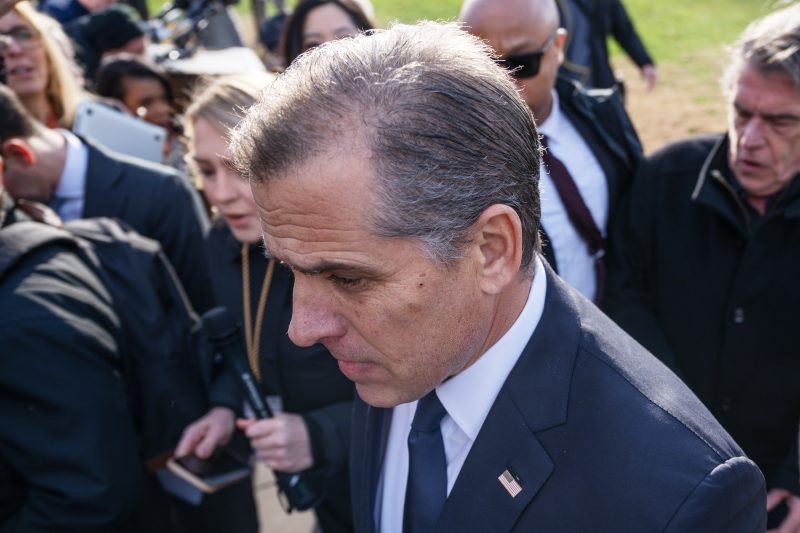At the beginning of May, Rep. James Comer (R-Ky.) and Sen. Chuck Grassley (R-Iowa) sent a letter to the Justice Department making a stunning accusation: Evidence existed of “an alleged criminal scheme involving then-Vice President Biden and a foreign national relating to the exchange of money for policy decisions.” The letter called on Attorney General Merrick Garland to make the “verifiable, valuable” evidence public.
For several months, Comer in particular publicly pushed for the release of an FBI interview form documenting the allegation — an allegation provided to the bureau by an informant who claimed to have been told about the bribe by a Ukrainian businessman. Grassley slowly leaked out new details from the interview document, such as a claim that there might be telephone recordings of the parties involved in the alleged bribe, including President Biden and his son, Hunter Biden. Eventually, Grassley released the whole document.
As it turns out, the Justice Department was working on the verifiability of the allegation. On Thursday, it unsealed an indictment: The informant who alleged that he’d been told about the bribe had allegedly made the whole thing up.
At the outset, the indictment summarizes the actions of the FBI informant, a man named Alexander Smirnov. Smirnov, it alleges, “transformed his routine and unextraordinary business contacts with Burisma in 2017 and later into bribery allegations against [Joe Biden], the presumptive nominee of one of the two major political parties for President, after expressing bias against [Biden] and his candidacy.”
Burisma, as you may know, is the firm that employed Hunter Biden as a board member, leading to a truly staggering array of political problems for his father. Smirnov claimed to have spoken with Burisma founder Mykola Zlochevsky and been told about multimillion-dollar bribes that Zlochevsky had made to both Bidens. Even before the indictment, this was dubious, in part because Zlochevsky had, at another point in time, told an ally of Rudy Giuliani’s that he’d never been in contact with Joe Biden.
The indictment walks through Smirnov’s communications with his FBI handler. In May 2020, Smirnov suggested to his handler that Biden would be “going to jail” over the leak of phone calls between Biden and former Ukraine president Petro Poroshenko — a leak that originated with a Ukrainian lawmaker who had provided information to Giuliani and was later sanctioned by the Trump administration as a Russian agent. Smirnov then said that the information about a bribe to Biden would “soon be in the news” and that he would try to prove it.
Giuliani’s slapdash efforts to dig up dirt on Biden in Ukraine had led then-Attorney General William P. Barr to set up a process for assessing such allegations based out of the FBI field office in Pittsburgh. In June 2020, that office contacted Smirnov about a reference he’d made in 2017 to Hunter Biden.
It was at this point, the indictment alleges, that Smirnov described conversations with Burisma executives during the Obama administration. During a 2016 meeting in Austria, Smirnov claimed, he’d been told by Zlochevsky about the alleged bribe.
But the indictment shows evidence that Smirnov couldn’t have had that conversation with Zlochevsky then. In fact, it alleges, Smirnov “met with officials from Burisma for the first time in 2017, after [Biden] left office in January 2017.” It documents how Smirnov informed his FBI handler about his initial contacts with the company’s executives after that point.
“The Defendant’s story to the FBI was a fabrication,” it alleges, “an amalgam of otherwise unremarkable business meetings and contacts that had actually occurred but at a later date than he claimed and for the purpose of pitching Burisma on the Defendant’s services and products, not for discussing bribes to Public Official 1 when he was in office.”
Again, there is no evidence to suggest that the bribery allegation was legitimate. The indictment is an unproven allegation, but it is much more robust in detailing how Smirnov invented the bribe than was his original allegation of a bribe.
Nor did Comer and Grassley ever generate any evidence to substantiate the bribe allegation. Instead, Comer spent his time trying to get the interview memorandum including the allegation released to the public — over the FBI’s objections, rooted in part on the fact that the claim hadn’t been verified.
It is hard to overstate how much energy Republicans and their allies in the right-wing media invested in the idea that this was credible. When he announced the launch of an impeachment probe of Biden in September, then-House Speaker Kevin McCarthy (R-Calif.) invoked the Smirnov allegation.
“Even a trusted FBI informant has alleged a bribe to the Biden family,” McCarthy said, suggesting that this demanded an investigation.
Fox News has mentioned Biden in the context of “bribe” or “bribery” more than 2,600 times over the past 12 months. A Media Matters review of host Sean Hannity’s efforts to bolster the Republican impeachment effort tallied at least 85 segments focused on the allegation and the FBI form that documented it — despite the complete dearth of evidence supporting the idea.
On Sept. 7, Comer was asked by a Fox Business host about the lack of movement on the bribery allegation. Comer suggested there had been a “coverup” by the government.
It appears that Comer was wrong.

